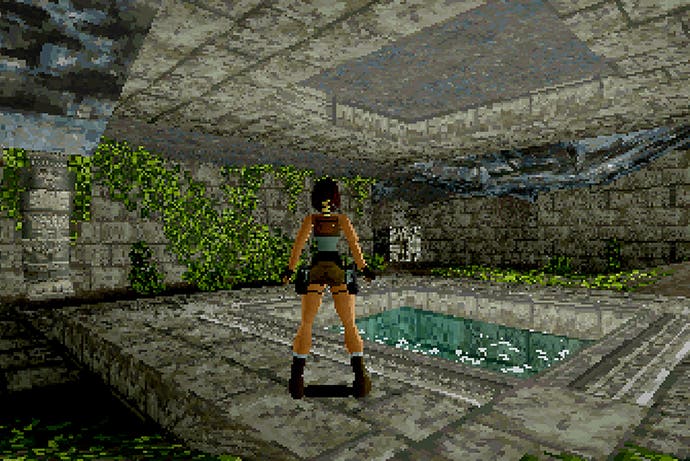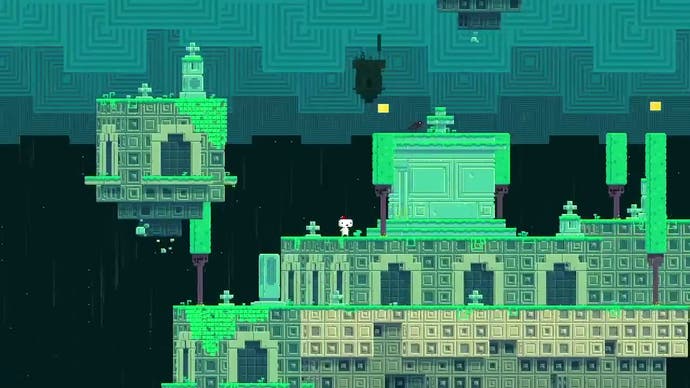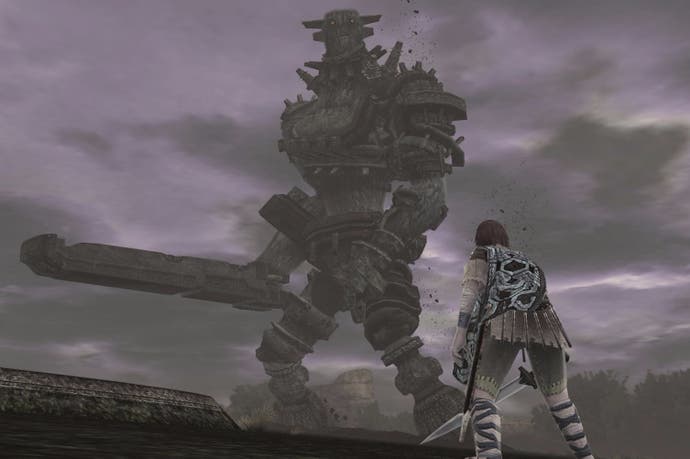The epic in the edgelands
Or: Why Shadow of the Colossus belongs in the Midlands.
I may be a city-boy, but I'm still a fan of The Great Outdoors. I've conquered all three of the national peaks, surviving only on service station flapjacks and chocolate Yazoo. I've enjoyed failing to make campfires as much as any modern half-man. Nostalgia for the romantic bucolic? I've felt those pangs, too. I'm particularly fond of the Yorkshire Tea 50-pack because of the stone walls and green-pastel fields printed on its foil bag; it reminds me of a more innocent time. Not one that I remember personally, mind - I was brought up in Birmingham.
Shigeru Miyamato, though, I reckon he had some Actual Innocent Times. I've read the stories of him moseying about his village home of Sonobe, going on mini expeditions around its local bamboo forest and into underground caves. Of course, eventually he would create the Legend of Zelda series, and people would make the link between his childhood escapades and the thrill of exploration so perfectly distilled and digitized into Link's adventures. And like anything vaguely rural and recounted it sounds just lovely, idyllic. You would not think it massively evocative of my own childhood adventures around England's underrated second city - more bamboo trees, fewer piss-smelling underpasses.
But I explored too, climbing over park gates and strolling overgrown canal paths, discovering metal skeletons of orphaned shopping trolleys in the wild, or spending some time admiring graffiti love pledges and penis sketches in those tiled underpasses (usually used for pissing). I admit, I also played a lot of video games, and spent many a happy hour sat indoors, absorbed in their simplified, skewed versions of the big wide world outdoors.
And you know what; they have a reputation as an unhealthy, anaemic past-time, indoor anchors that tether kids to darkened bedrooms and empty, pale-skinned lives of chronic virginity and virtual achievements - but I'm not sure it's that simple. In fact, I secretly (now-publicly) think that video games have affected my perception of place and the outdoors in good ways or, at the very least, interesting ways.

They've certainly changed my relationship with the urban outdoors; the often Ignored-Outdoors of unseen and unacknowledged in-between lands, too often mistaken for just The Crap Outdoors. You see, i'm also a fully-fledged fan of inner-city and edge-of-city adventuring, journeying through the alternative English pastoral of interstitial spaces. The type celebrated in the wonderful book Edgelands, by the poets Paul Farley and Michael Symmons Roberts in which they document with understated lyricism this often accidental landscape, and the human dramas set in and around 'unexamined places that thrive on disregard'. These are strange places of unnatural contours; of metal railings and tarmac flats, of curbs and walls and failed urban planning. Hodge-podge places where purple-topped buddleias fringe railway lines like bunting, and rectangular gardens are backed by wild woodland spaces, their trees growing up beside an adopted brethren of rusting telegraph poles and sports field floodlights. These are places where nature is constantly interrupted and interfered with by construction and concrete.
To me and - I suspect - most children of the city, they're just normal. But more than that; I've always felt them somehow congruent with the made worlds of third-person adventures and 2D platformers; worlds not built with but dependent on the clean edges and blocky shapes of pixels and polygons. Like the tombs I raided as Lara Croft on our old 1GB Pentium, all blocks and edges and spirit-level perfect ledges. Or Fez's luminous, rotating dioramas, satisfyingly translated into the binary of flat platforms and the falls in between them. Don't even get me started on Shadow of the Colossus' beautiful giants, their dirty, grassy hides punctuated only by slabs of chunkily grab-able, graspable stone. Mysticism and ethnic allusions be damned, if I made a Shadow of the Colossus film it'd be set in the overgrown industrial wastelands of the Midlands.
What this also means is that video games are often not only inherently edgeland-y, often simplifying the outside world through their lens of the functional and flat, but also that they can relish unusual settings normally deemed mundane. Settings like warehouses and oil rigs. Settings like Dunwall's steampunk Victoriana, so full of gas-lit archways and shadowy alcoves, or Half-Life 2's journey into the city, through the bloom-lit waterways of Route Kanal (pro-fact: Birmingham has more canals than Venice) and the proper, bona-fide edgelands of Highway 17. I still think of the sunset-sky melancholy of Metal Gear Solid 2's Big Shell oil facility if I climb so much as an orange-rusted girder.
In a way I think video games have helped validate these places for me, recognising them as worthy of notice and re-creation. Instead of being relegated to a moody backdrop for some BAFTA-nominated kitchen sink drama set in modern Britain, the areas are sort-of celebrated as places of gameplay drama, of traversal and of space.

I think that's the biggie for me: Space; whether wide-open or cramped, overlapping, underhanging or otherwise. Because growing up with games has given me ringside seats on the medium's disordered story of genesis, with each new step in technology bringing exciting ingredients into game worlds - Bloom Lighting! Physics! Separate Blades of Grass! It's enough to give a young boy a certain level of excitable hyper-awareness, leaking outside of game time and forming into something approaching actual real-world appreciation - Look at those Separate Blades of Grass! And for myself, probably due to my childhood diet of flat-textured N64-platformers and 3D-adventure games, it's given me a taste for spaces, and the shapes that make them, border them, build them. It amplifies the unadorned urban, helps me see the epic in the edgelands. I can still be reminded of the haunting scale and emptiness of Ico's castle when crossing the sun-baked tarmac plain of an empty car park.
I'm not exactly sure what to call it: This relation between the artificial, purposed playgrounds of games and these unintended proxy worlds of the urban - a spatial philosophy? If I was a Parkour Traceur, or an insufferable philosophy student - or just generally French - I'd probably say something about 'beauty' and 'elegance'. Something about the paraphernalia of man-made features lending an unwitting sense of ludic form and function to the geometry of the hybrid-urban. But I'm English and prone to debilitating spasms of cringe so will just say that in a small way, video games have taught me to see beau... appeal in places often overlooked.
I do realise this is all probably my high-falutin' excuse for the fact that I still play outside. That despite being a grown man with a respected vocation, I will still go out to climb over, under and around some local enclave of weeds and walls, just for its own sake. I'm none too fussed about the need for validation, whether through a formalised sport or some YouTube-recorded immortality. In a way, I think somehow playing video games has helped a little to incubate my childhood sense of the importance of play itself and the ability to find local adventure. And in general a satisfaction with large flat objects.
Ultimately - and you may think I'm pushing it here - I think they may even have helped me enjoy the sensation of presence in these places. There's some games that I don't delete when finished, preferring to leave them installed and ready to be delved into when the mood takes me. This isn't because there's any more bosses to beat or high-scores to top, but just because I like the feel of Okami's wolf-gallop across the plains, or the just-so weight of Dante's jump in the new DmC. I could wax-lyrical about the cushioned drop of Samus' drop in Metroid Prime, or enjoy the measured speed of her gaze as you peer around the sun-kissed Chozo Ruins. And in an oblique way I think all those arguments about Little Big Planet's overly-floaty jump or developer interviews citing Assassin's Creed crowd-palming or whatever are partly people debating the thrill of presence, the sense of connectedness to a game world - that feeling of just moving through it and being part of it, the unique video game pleasure of just pissing about in a space; moving, watching, testing it and teasing it - soaking up a place through mental and physical there-ness.
A couple of weeks ago I was out with my brother and cousin at around 2am, tight-rope walking along the edge of a huge steel container that had overgrown with grass. We had to climb this wooden fence to get there, making sure to walk right under the security camera recording the abandoned land, which would one day be a car park, but was currently our small space of post-apocalypticana, all feral weeds and crumbling concrete. Every now and then the sky would flash white with sheet lightning, like the sky was taking snaps. I had more fun than was healthy, and I probably owe that more to my unhealthy childhood hobby than I could ever admit or explain.

